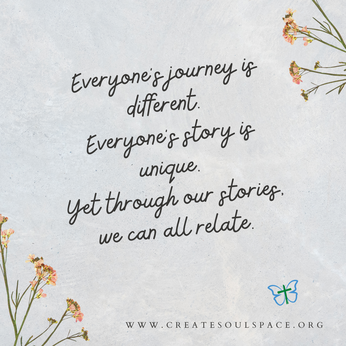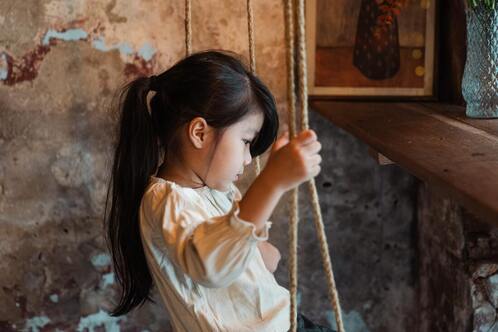|
Betrayal trauma tends to cause a person to feel as if they're merely moving through life, zombie-like. The world is passing them by. Everyone else seems to be having fun, but they're not. Fun is too dangerous. Too much risk. Unsafe. At least this has been my experience. I feel like I’ve been buried for a long time, cut off from the rest of the word -- and cut off from myself. But I can now -- finally -- hear God calling. Talitha Cumi. Talitha Cumi. Little girl, arise!
Now is the time for healing and renewal from the ravages of trauma and domestic abuse.
0 Comments
I have something new to share with my readers -- readers who can now become viewers or listeners. Instead of a written article, I'm sharing with you an interview I just did with Angela Erickson of the Integrated with Angela podcast. In this chat we discuss all aspects of domestic abuse, including some of my personal story. We also discuss the psychological aspects of abusers, and that often-asked question: Can abusers change? My answer is yes!
With a gigantic amount of hard work (from both the abuser and the victim), patience, determination, love and spiritual renewal, someone with an abusive personality can take the Road to Damascus and become a virtuous, loving spouse. Yes, it takes a great deal of excruciating effort from everyone involved. No, it's not an easy path. But for some couples, it's the path to take. However, change isn't common. Often abusers will claim to "change," but it's merely part of the "love-bombing" phase of the abuse cycle. There are ways to discern to discern whether or not change is real, all of which take an immense amount of time. I'm not talking weeks or months of time -- I'm talking years. Many, multiple years. If you have any questions about this topic, feel free to contact me. With all that said, click the link below to watch my interview with Angela Erickson. Recently I had to set boundaries with two people in my life. Setting boundaries can be challenging, especially for someone who was never taught the skill (yes, it's a skill) and who may find self-care difficult. This was the case with me -- yet in both instances, after I set the boundaries, I was also set free.
What was interesting were the reactions I received after establishing my boundaries. The results were the same -- freedom from toxic abuse -- but the reactions from my loved ones were drastically different. Letting go of the past can be an excruciating process. If you've endured any sort of trauma in your life, you may be able to relate to what I mean. Even positive memories become tainted by the abuse and trauma, creating a swirling confusion of cognitive dissonance within a survivor. How can we move on from so much pain?
There's no easy answer, and everyone's path is unique. However, I can offer you a few of my thoughts and experiences as I've suffered along this path. I hope it maybe of some help. The month of October is many things: the peak of leaf-peeping season (if you're a New Englander like me), the time of year when all things pumpkin spice flavoured (or scented) appears in every store, the month of scarecrows and holiday anticipation. But October can also boast one other very important claim -- it's Domestic Violence Awareness Month. The facts are shocking -- one out of every three women are being or will be abused within their own homes. This statistic is unyielding across demographics, including religion. What this means for us is that one out of every three women sitting in the pews within our parishes are being victimized within what should be the safety of their own homes. Obviously men can—and are—also victims, but domestic violence “tends to harm women and children more,” as the USCCB points out. 85% of domestic violence targets are female victims of male partners. This is the reason for the focus on women in this review. In 1992—updated in 2002—the USCCB issued a crucial document regarding the Catholic Church’s stance on domestic abuse. Yet “When I Call for Help: A Pastoral Response to Domestic Violence Against Women,” hasn’t received the attention it deserves. Unfortunately, it remains unknown by too many clergy and victims alike.
I’d like to help change that. Many Catholic women suffering in abusive marriages feel like they have to tolerate the abuse. Their union is a sacrament, and the Church teaches that marriage is indissoluble (CCC 1664-1645). That means they’re stuck, right? Actually, no. Not at all. Because this is the most personal, difficult, and painful article I've yet written, I'm not going to begin with much introduction. All I want to say here is that I wrote this article during Adoration, in one big rush as I begged Jesus to release me from my suffering, to heal me from my pain.
Domestic abuse within an intimate relationship breaks a person apart -- but that's not necessarily a bad thing, even though it seems to be at first. Later, moving through the healing journey, I came to realize that the dismantling of self was an invitation from God to rebuild who I truly am. Made in His image. However, before I could even begin to do that, I had to explore the root causes of my pain. |
AuthorJenny duBay, Trauma-Informed Christian life coach specializing in healing from betrayal trauma and domestic abuse. |







